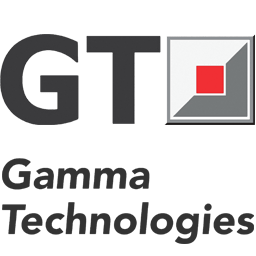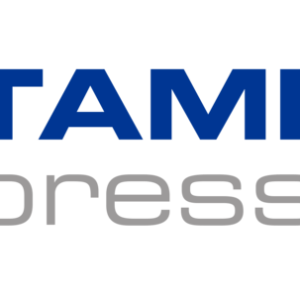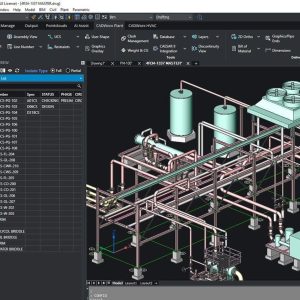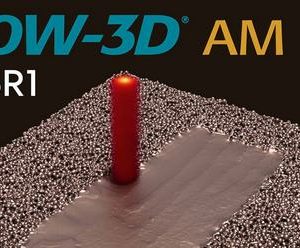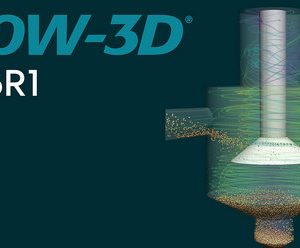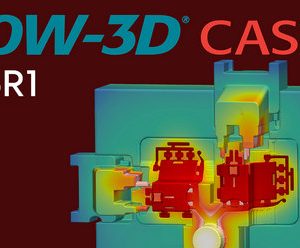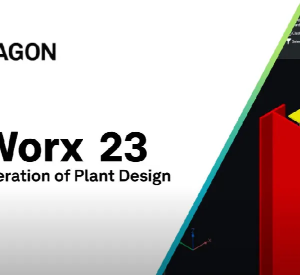GT-SUITE v2025.2 build 2.0101
$ 180.00
GT-SUITE v2025.2 Build 2.0101 – Advanced Multi-Physics Simulation Software
GT-SUITE v2025.2 Build 2.0101 from Gamma Technologies is the latest industry-leading system simulation software for modeling, analysis, and optimization of complex multi-physics systems. This version delivers enhanced accuracy, speed, and integration for automotive, aerospace, energy, and industrial applications.
With powerful 0D/1D/3D simulation tools, GT-SUITE enables detailed studies of engines, batteries, thermal systems, vehicle dynamics, NVH, and powertrains — all within a unified platform.
The v2025.2 update introduces improved solver performance, new electrification modules, and enhanced co-simulation with MATLAB®, Simulink®, and FMI-compatible tools.
✅ Features:
-
Latest official release: GT-SUITE v2025.2 (Build 2.0101)
-
Faster solvers and optimized simulation workflow
-
Expanded EV & hybrid powertrain libraries
-
Improved GUI and 3D visualization
-
Full compatibility with GT-Power, GT-Drive, and GT-Cool modules
Description
🚀 GT-SUITE v2025.2 Build 2.0101 – Next-Generation Multi-Physics System Simulation Software
GT-SUITE v2025.2 (Build 2.0101) by Gamma Technologies is the most advanced release yet of the world’s leading integrated multi-physics simulation platform for vehicle, powertrain, electrification, and thermal systems engineering.
Developed for engineers and researchers who demand accuracy, flexibility, and scalability, GT-SUITE 2025 brings a new era of model-based systems engineering, AI-enhanced modeling, and real-time simulation capabilities.
This latest Build 2.0101 update refines performance, stability, and cross-module integration while introducing powerful new modeling features that simplify workflows and accelerate innovation.
From engine combustion and hybrid powertrains to battery packs, thermal management, and digital twins, GT-SUITE v2025.2 delivers a unified environment for all physics domains in one cohesive platform.
🌟 Key Highlights of GT-SUITE v2025.2 Build 2.0101
⚙️ Performance & Solver Enhancements
-
Up to 40% faster refrigerant circuit simulations, thanks to re-engineered solvers and multi-threading improvements.
-
Optimized runtime and memory efficiency for large-scale DoE (Design of Experiments) studies and sensitivity analyses.
-
Improved GPU acceleration support for 3D flow and conjugate heat-transfer simulations.
-
Solver stability has been increased across the GT-Power, GT-Drive, and GT-Cool modules, resulting in smoother convergence and lower error sensitivity.
🧠 AI & Machine Learning Integration
-
The Machine Learning Assistant now supports anomaly and fault detection, allowing automatic training of metamodels to detect issues such as valve sticking, thermal imbalance, or leakage during simulation.
-
Built-in data analytics and predictive modeling streamline the creation of digital-twin systems that learn from measured data and predict real-world performance.
🔋 Battery & Electrification Upgrades
-
GT-AutoLion adds full support for sodium-ion battery chemistry, in addition to lithium-ion and solid-state models.
-
A semi-automatic calibration wizard accelerates parameter identification and electrochemical model setup.
-
Enhanced thermal-electrical coupling improves heat-generation prediction in high-current cells and packs.
-
Extended battery aging, degradation, and fast-charge modeling options for EV and HEV systems.
🌡 Thermal & 3D Flow System Improvements
-
Major upgrades to GT-Auto-3DFlow: faster runtimes and enhanced 3D heat-exchanger handling with contact surface corrections.
-
Transient Foster & Cauer thermal network support for accurate semiconductor junction temperature prediction.
-
New Solar Cell Template for modeling vehicle photovoltaic power systems.
-
Updated heat-pump, HVAC, and coolant flow modules with improved refrigerant property datasets.
🚗 Vehicle Dynamics & Controls
-
Extended vehicle model (14-DOF) simulation with real-time or faster-than-real-time computation for driver-in-the-loop validation.
-
New StartStopController and DriveModeSwitcher templates for hybrid & ICE vehicles.
-
Expanded signal capacity (up to 500 signals) in templates like ReceiveSignal, SendSignal, and Sum for complex control architectures.
-
“Synchronize Fast Models to Real-Time” function enables hardware-in-the-loop (HiL) and ECU testing workflows.
🔬 Chemical & Process System Enhancements
-
GT-xCHEM v2025.2 introduces improved distillation column templates and an upgraded ET2GT model migrator for easier legacy conversion.
-
Support for advanced reaction-network kinetics, phase-change modeling, and fluid property databases.
🔊 NVH, Acoustic, and Structural Improvements
-
Enhanced coupling between GT-Vibe, GT-Cool, and GT-Power improves vibro-acoustic correlation.
-
New post-processing capabilities in GT-POST deliver faster plotting and larger data-set handling.
-
Better integration with external FEA tools and GT-FEMAG for motor vibration analysis.
🧩 Extended Toolchain Integration
GT-SUITE v2025.2 is fully interoperable with a wide range of CAE and controls tools:
-
Seamless co-simulation with MATLAB®, Simulink®, Amesim®, and Modelica/FMI 2.0 tools.
-
Python API improvements make automation, data extraction, and batch execution faster and more stable.
-
Enhanced model exchange and import/export options with FMU, CSV, and GT-XML formats.
-
Direct connection to GT-PowerForge, GT-FEMAG, and GT-AutoLion for electrical machine and battery analysis.
🐞 Bug Fixes & Stability Enhancements
The Build 2.0101 update includes over 200 verified fixes addressing solver robustness, numerical consistency, and GUI performance:
-
Fixed random solver crashes in refrigerant circuits and combustion networks.
-
Resolved plotting lag in GT-POST with large transient data sets.
-
Corrected signal template overflow when exceeding 250 signals in older models.
-
Improved error handling for Python API execution and macro commands.
-
Fixed memory leaks during DoE execution on multi-core systems.
-
Security updates to licensing and internal file verification.
-
Enhanced compatibility with Windows 11 and RHEL 9 operating systems.
🖥 System Requirements
Operating Systems
-
Windows: Fully supported on Windows 11 Pro/Enterprise 64-bit (recommended).
-
Windows 10 support deprecated for v2025.2 and later.
-
-
Linux: Supported on RHEL 9, SUSE SLES 15 SP7, Ubuntu 22.04 LTS, Amazon Linux 2023.
-
macOS: Not officially supported (virtualized use possible).
Hardware Recommendations
-
CPU: 8-core or higher (Intel® Core™ i9 / Xeon® / AMD Ryzen 9).
-
RAM: 64 GB minimum (128 GB recommended for complex 3D/thermal models).
-
Storage: 1 TB SSD minimum with high I/O speed.
-
GPU: NVIDIA RTX series or equivalent for 3D graphics acceleration.
-
Network: Stable LAN or VPN for license server connection.
Software & Licensing
-
Requires a valid GT-SUITE 2025 license (Build 2 compatible).
-
Compatible with FlexNet license manager.
-
Recommended companion tools: GT-Power, GT-Drive, GT-Cool, GT-AutoLion, GT-POST.
💡 Interesting Facts & Industry Relevance
-
GT-SUITE is the foundation of model-based engineering at top OEMs such as BMW, Ford, GM, Airbus, Bosch, and Toyota.
-
The 2025 release aligns with the industry’s electrification and sustainability focus, adding sodium-ion and hydrogen modeling to future-proof simulation workflows.
-
Gamma Technologies introduced an internal “Signal Explorer” for global model overview — a major usability leap for large simulation projects.
-
Its Machine Learning Assistant brings predictive modeling directly inside the simulation environment — bridging simulation and AI analytics.
-
Build 2.0101 marks the last major maintenance release before the upcoming GT-SUITE v2026, expected February 2026.
📦 Why Upgrade to GT-SUITE v2025.2 Build 2.0101?
✔ Massive runtime reductions and improved solver reliability.
✔ Broadened physics coverage — from combustion to electrification.
✔ New templates for control logic, solar, and hybrid powertrains.
✔ Enhanced integration with Python and MATLAB ecosystems.
✔ Extended digital-twin and real-time simulation capabilities.
✔ Future-ready support for new OS and hardware architectures.
✅ Conclusion
GT-SUITE v2025.2 (Build 2.0101) represents the most refined and powerful simulation release from Gamma Technologies to date.
With unmatched modeling fidelity, accelerated performance, and cutting-edge integration, it empowers engineers to design cleaner, faster, and more efficient systems across industries.
Upgrade today to experience the next level of multi-physics system simulation and digital-engineering innovation.
⭐️⭐️⭐️⭐️⭐️ Outstanding Simulation Platform – GT-SUITE v2025.2 Raises the Standard for Multi-Physics Modeling
As a senior simulation engineer working daily with GT-SUITE, I can confidently say that v2025.2 Build 2.0101 is a major leap forward in both capability and stability. The new solver architecture is noticeably faster — we’ve seen runtime reductions of 30–40% on complex thermal and powertrain models. The improved GT-AutoLion battery module now handles sodium-ion chemistry with remarkable precision, and the expanded control-signal handling makes hybrid system modeling smoother than ever.
One of my favorite additions is the Machine Learning Assistant, which integrates predictive analytics and anomaly detection directly into the modeling workflow. This feature has helped our team identify performance deviations long before they appear in physical testing. The Python API enhancements also make automated design-of-experiments and optimization much easier to script.
The interface feels cleaner, the 3D visualizations are sharper, and GT-POST now processes large data sets without lag. Integration with MATLAB® and FMI tools works flawlessly — a big win for collaborative model-based development.
In short, GT-SUITE v2025.2 Build 2.0101 is an exceptional release from Gamma Technologies. It combines engineering depth, simulation speed, and real-time capabilities in one unified environment. Perfect for professionals working on vehicle dynamics, thermal systems, electrification, or digital-twin development.
If you rely on accurate, scalable, and future-ready system simulation, this version is absolutely worth the upgrade.
Highly recommended. Five stars. 🌟🌟🌟🌟🌟


